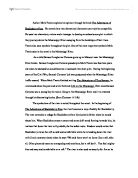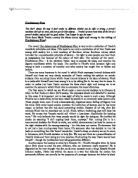Yoo 2
use of the word “nigger” and the exceedingly racist views expressed by most characters. Although the book is peppered with racist stereotypes and belittling remarks but Twain uses them as a part of irony. Huckleberry Finn is not racist but a profound social statement on the inhumanity of slavery with irony and satire. For example, in chapter 32 Aunt Sally and Huck discuss a steamboat explosion, “Good gracious! Anybody hurt?” she asks, “No’m, killed a nigger.” Anyone who took this statement literally misses the point. Twain uses this casual dialogue ironically as a way to show the chilling reality about the old South. To drive the point home Twain has the lady continue, “Well, it’s lucky because sometimes people do get hurt.” On the surface, it could easily be interpreted as racism but Twain uses it to reveal the cold truth of white attitudes in the 1800’s. It is important not to take a novel at face value and to “read between the lines” in order to capture the underlying theme of the novel. Thus, in a subtle manner, he does not create an apology for slavery but rather a challenge to it.
Furthermore, not only do people misinterpret the basic concept of the story, but they misunderstand the role of the character Jim. Twain causes the reader to challenge the original description of Jim as illiterate, childlike, not very bright, and extremely superstitious. Twain shows the true representation of Jim through the relationship between Huck and himself. Jim at first accounts nothing but a source of amusement for Huck, but Huck slowly discovers the real person inside of Jim. For example, in chapter 23 Huck states, “…I do believed that he cared just as much for his people as white folks does for ther’n.” Later, Huck goes even further to say, “…I knowed Jim was really white inside.” This naïve statement was the highest compliment he could’ve given to Jim and
Yoo 3
emphasized that a black man has feelings and emotions. Also, Twain emphasized the connection made by Huck and Jim. Throughout the whole story Huck has a constant confrontation by two opposing forces, society and friendship. Many times Huck almost turned Jim in but could never be able to see a reason as to why Jim, one of his only friends, should be a slave. Through Huck’s internal struggle, Twain shows his opinion of the absurdity of slavery and the importance of following one’s conscience before the laws of society. Additionally, by the end of the novel, Huck and the reader have come to an understanding that Jim is not someone’s property and an inferior being, but an equal. Also, not only do white critics make a similar point but Booker T. Washington stated how Twain “succeeded in making his readers feel a genuine respect for him” and point out that Twain, in creating Jim’s character, had “exhibited his sympathy and interest in the masses of the negro people.” Hence, Twain presents Jim hardly as a mockery of the black people, but rather the moral center of the book and a man of courage and nobility.
Additionally, Mark Twain depicted a racist society because the society he wrote about was racist in reality. Since Huck tells the story from his point of view, Huck reflects the racist sentiments of the society that embraced him. Although quite saddening, the negative description of Jim as an illiterate and not very bright individual was probably accurate. Jim and the millions of other slaves in the South had no formal education, were never allowed any independent thought, and had constant maltreatment and abuse. Twain merely portrays Jim as a very realistic slave raised in the South during that time period. To say that Twain possessed racial views because of his desire for historical accuracy is absurd. Furthermore, the book represents the Southern lifestyle during the pre-Civil War,
Yoo 4
a time where people referred to African Americans as “niggers”. The constant usage of the word “nigger” does not make Huck Finn a racist book, rather a historically accurate story placed twenty years before the Civil War. Therefore, since Huck narrates the story, any racist views that come through reflect the views of society, not Mark Twain’s views, during a racial time period.
Throughout the novel, the racist remarks are not voiced by Twain himself but through Huck. It is vital for the reader to recognize these ideas as those of society and to recognize that Twain throughout the novel disputes these ideas. Also, the racist and hateful disdain in the novel holds historical accuracy since it takes place during the years prior to the Civil War. Twain brings out the wickedness of society and causes the reader to view the negative description of Jim in the beginning of the book in a different light as the story progresses. Mark Twain does not advocate and/or posses racist views but rather sophisticatedly mocks the racist ideas of society in the underlying themes of the novel.







